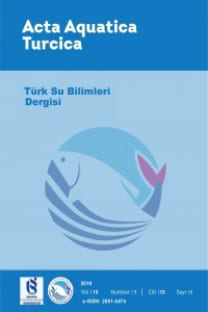Alabalık İşletmeleri ve Delphi Anket Yöntemi
Küreselleşmenin hızlandığı günümüzde su ürünleri sektörünün özellikle su ürünleri işletmelerinden Alabalık işletmelerinin önemi gün geçtikçe artmaktadır. Bu araştırmada Tarım, Gıda ve Hayvancılık Bakanlığı kayıtlarından alınan Türkiye’deki alabalık işletme adresleri kullanılmıştır. Bu alabalık tesislerine Delphi anket yöntemi uygulanmıştır. Anket sonuçlarında elde edilen uzman görüşlerine göre Türkiye’ de alabalık yetiştiriciliğinin sorunlarını çözümlenmesi ve gelişmesine yönelik yapılması gerekenler şunlardır; İşletme açmak, üretimde devamlılığı sağlamak ve üretilen malı pazara sürmek için gerekli olan bürokratik formaliteler azaltılmalıdır. Üretimin kaliteli ve yüksek verimde yapılabilmesi için hastalıktan ari yavru ve yumurta üretimi teşvik edilmelidir. Yem fiyatları yüksektir. Bu nedenle yem kalitesi düşürülmeden fiyatlarda indirime gidilmelidir. Alınan vergilerin azaltılması bu sorunun çözümünde iyi bir adım olabilir. İşletmelerin kredi gereksinimlerinin giderilmesine yönelik kredi sağlayan kuruluşların işletmelerin mevcut durumlarını dikkate alarak alternatif şartlar geliştirmesi yarar sağlayacaktır. Gerek işletmelerin kuruluş aşamasında, gerekse üretim aşamasında ilgili kurumlarca işletmelere yeterli düzeyde teşvik sağlanmalıdır. İşletmelerde genel olarak karşılaşılan sorunların çözümünde kooperatifleşmeye gidilmesi şarttır. Sonuç olarak, Türkiye’nin çeşitli bölgelerinde alabalık yetiştiriciliği sektörü içinde aktif olarak çalışan uzmanların ortaklaşa belirledikleri sorunların uygun bir biçimde çözümlenmesiyle, sektörün ülkemizde gerek ekonomik gerek bilimsel olarak ilerleme kaydedeceği açıkça görülmektedir
Anahtar Kelimeler:
Delphi Tekniği, Yetiştiricilik, Alabalık İşletmeleri, Türkiye
Trout Enterprises and the Delphi Survey Methodology
The importance of trout enterprises which are the ones out of particularly fishery enterprises of fishery sector is gradually increasing in these days during which the globalization has gained speed. In this study the addresses obtained from the ministry of food, agriculture and livestock records were used. The Delphi survey methodology was applied to these trout enterprises. The followings have to be done to solve the problems of trout farming and to develop the trout farming according to expert opinions obtained from the survey results: establishing a trout enterprise, providing continuity in production and reducing the bureaucratic formalities required for putting the produced good on the market. Production of baby trout and egg free from any disease has to be promoted to provide a production of good quality and high efficiency. Fish-feed prices are high. Thus, the prices should be reduced without reducing the feed quality. Reducing the taxes may be a good option to solve this problem. It will be useful that the credit institutions provide alternative conditions to meet the credit requirements of the enterprises by taking into consideration the current situations of the enterprises. The enterprises should be promoted by the relative institutions both during establishment phase of the enterprises and the production phase. For the solution of the problems generally encountered in the enterprises, it is an obligation to become a cooperative. As a result, it is obvious that this sector will make progress both economically and scientifically by solving the problems determined by the experts working actively in trout farming sector in different regions of Turkey in a suitable way
Keywords:
Delphi Technique, Aquaculture, Trout Enterprises, Turkey,
___
- Canyurt, M.A., Akhan, S., 2009. Development and Situation Of Trout CultureInTurkey.15. International Scientific Conference- Research For Rural Development 2009. Annual 15th International Scientific Conference Proceedings. Latvia University of Agriculture, 19-21 May 2009, pp. 90-94, Jelgava, Latvia.
- Canyurt, M.A., Guner, Y., Toksen, E.,2009. Sustainable Development of Aquaculture in Turkeyand Its Constraints. 1. International Symposium on Sustainable Development, Science and Technology Proceedings, 3:45-49, International Burch University, June 9-10 2009, Sarajevo
- Canyurt, M.A., 2010. Bozdoğan’s Evaluation of water potential and Fisheries. 13-15 May 2010, Environment and Culture Symposium in Bozdoğan. Bozdoğan, Aydın.
- Canyurt, M.A., 2010. Sustainable Aquaculture and Environmental Interaction. Second International Symposium On Sustainable Development.June 8-9, 2010, Sarajevo., International BurchUniversity Publications, pp. 678-682.
- Canyurt, M.A., 2010.Cultivation of trout in Turkeyyesterday, todayandthen future. 2. Trout Symposium, Karamanoğlu Mehmetbey University. 6-8 july 2010, Ermenek, Karaman
- Dalkey, N., Helmer, O., 1962. An Experimental Application of the Delphi MethodtotheUse of ExpertsThe RAND Corporation, Santa Monica.
- Duvarcı, Y., Selvi, Ö., Günaydın, H.M. And Gür, G., 2008.TheEffects of Transportation Projects on Urban Trends in İzmir, İMO Technical Journals, 4293-4318, article283
- Erlfmeyer, R., Erffmeyer, E. andLane, I. 1986.The Delphi Technique: An Empirical Evaluation of the Optimal Number of Raunds. Group&Organization Management, 11(1-2), 120-129.
- Güven, M., Kürüm, D., 2006.Relationshipbetweenlearningstylesandcriticalthinking a general overview, Social sciences journals2006/1
- Lınstone, H. and Turoff, M., 1975. "Introduction" The Delphi Method: Techniques and Applications Linstone and Turoff (Editörler) Addison- Wesley Publishing Company, London.
- Lınstone, H. And Tomlın, M., 1975. ''The Delphi Method: Techniques and Applications", Reading, MA:Addison-Wesley.
- Pollard, R., Tamlın, M., 1995. "TheUse of Expert Teachers to Improve Education." Education, 116(1), 3-9.
- Quınn, P., 1986. "Utilization-Focused Evaluation." Newbury Park, CA: Sage Publications.
- Rothwell, W.J., Kazansas, H.C., 1997. ''Mastering The Instructional Design Process: A Systematic Approach", San Francisco: Jossey- Bass.
- Rowe, G., Wrıght, G., Bolger, F., 1991. "Delphi: A reevaluation of Research and Theory" TechnologicalForecastingandSocialChangeVol39, 23S-251.
- Saekman, H., 1975. "Delphi Critique: Expert Opinion", Lexington, MA: Lexington Books.
- Şahın, A.E., 2001. “Delphi technique and itsuses in educational” Hacettepe University the Journal of Education20: 215 – 220.
- Turoff, M., Hıltz, S.R., 2001. "Computer Based Delphi Processes" London: Kingsley.
- Woudenberg, F., 1991. "An Evaluation of Delphi" Technological Forecastingand Social Change 40, 131-150.
- Zelıff, N.D., Heldenbrand, S.S., 1993. "What Has Being Done InThe International Business Curriculum?" Business Education Forum, 48(1), 23-25.
- Yayın Aralığı: Yılda 4 Sayı
- Başlangıç: 1988
- Yayıncı: Yunus Ömer BOYACI
Sayıdaki Diğer Makaleler
Halacaropsis hirsuta (Acari: Halacaridae)’nın Türkiye Faunası İçin İlk Kaydı
Furkan DURUCAN, Yunus Ömer BOYACI
Finike (Antalya) Körfezin’de Dip Paraketasındaki Farklı İğnelerin Av Verimi
Vibrio anguillarum Suşlarında Çevreyi Algılama Sistemi ve Virülens Faktörlerinin İncelenmesi
Nurdan NURCAN, Ayşegül KUBİLAY, Gülgün BOŞGELMEZ-TINAZ
Alabalık İşletmeleri ve Delphi Anket Yöntemi
Hülya SAYĞI, Mehmet Ali CANYURT, Yusuf GÜNER, Fatih GÜLEÇ, Gizem IŞIK
Antalya İli Su Ürünleri Tüketim Alışkanlıklarının Belirlenmesi
Korkuteli (Antalya)’deki Alabalık İşletmelerinin Yapısal Analizi
